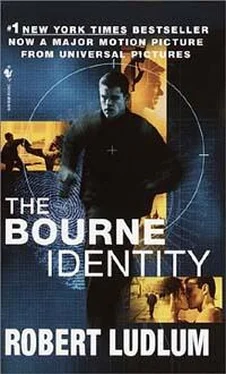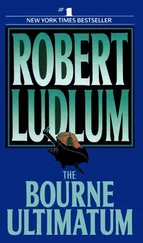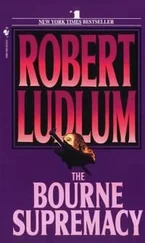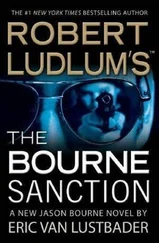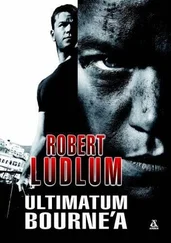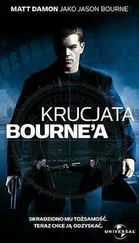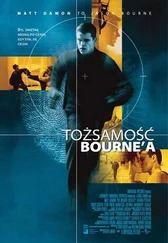“Goddamn it, start the car! Get out of here!”
“Where? You didn’t say where.” The woman was not screaming; instead she was calm.
Unreasonably calm. Looking at him … was she looking at him?
He was feeling dizzy again, losing focus again. “Steppdeckstrasse…” He heard the word as he spoke it, not sure the voice was his. But he could picture the doorway. Faded dark red paint, cracked glass … rusted iron. “Steppdeckstrasse,” he repeated.
What was wrong? Why wasn’t the motor going? Why didn’t the car move forward? Didn’t she hear him?
His eyes were closed; he opened them. The gun. It was on his lap; he had set it down to press the bandage … she was hitting it, hitting it! The weapon crashed to the floor; he reached down and she pushed him, sending his head against the window. Her door opened and she leaped out into the street and began running. She was running away! His hostage, his conduit was racing up the Löwenstrasse!
He could not stay in the car; he dared not try to drive it. It was a steel trap, marking him. He put the gun in his pocket with the roll of tape and grabbed the gauze, clutching it in his left hand, ready to press it against his temple at the first recurrence of blood. He got out and limped as fast as he could down the pavement.
Somewhere there was a corner, somewhere a taxi. Steppdeckstrasse.
Marie St. Jacques kept running in the middle of the wide, deserted avenue, in and out of the spills of the streetlamps, waving her arms at the automobiles in the Löwenstrasse. They sped by her. She turned in the wash of headlights behind her, holding up her hands, pleading for attention; the cars accelerated and passed her by. This was Zurich, and the Löwenstrasse at night was too wide, too dark, too near the deserted park and the river Sihl.
The men in one automobile, however, were aware of her. Its headlights were off, the driver inside having seen the woman in the distance. He spoke to his companion in Schweizerdeutsch.
“It could be her. This Chernak lives only a block or so down the street.”
“Stop and let her come closer. She’s supposed to be wearing a silk … it’s her!”
“Let’s make certain before we radio the others.”
Both men got out of the car, the passenger moving discreetly around the trunk to join the driver.
They wore conservative business suits, their faces pleasant, but serious, businesslike. The panicked woman approached; they walked rapidly into the middle of the street The driver called out.
“Was ist passiert, Fräulein?”
“Help me!” she screamed. “I … I don’t speak German. Nicht sprechen. Call the police! The … Polizei!”
The driver’s companion spoke with authority, calming her with his voice. “We are with the police,” he said in English. “Zurich Sicherheitpolizei. We weren’t sure, miss. You are the woman from the Carillon du Lac?”
“Yes!” she cried. “He wouldn’t let me go! He kept hitting me, threatening me with his gun! It was horrible!”
“Where is he now?”
“He’s hurt. He was shot I ran from the car … he was in the car when I ran!” She pointed down the Löwenstrasse. “Over there. Two blocks, I think—in the middle of the block. A coupé, a gray coupé! He has a gun.”
“So do we, miss,” said the driver. “Come along, get in the back of the car. You’ll be perfectly safe; we’ll be very careful. Quickly, now.”
They approached the gray coupé, coasting, headlights extinguished. There was no one inside.
There were, however, people talking excitedly on the pavement and up the stone steps of Number 37. The driver’s associate turned and spoke to the frightened woman pressed into the corner of the rear seat.
“This is the residence of a man named Chernak. Did he mention him? Did he say anything about going in to see him?”
“He did go; he made me come with him! He killed him! He killed that crippled old man!”
“Der Sender—schnell,” said the associate to the driver, as he grabbed a microphone from the dashboard. “Wir sind zwei Strassen von da.” The car bolted forward; the woman gripped the front seat.
“What are you doing? A man was killed back there!”
“And we must find the killer,” said the driver. “As you say, he was wounded; he may still be in the area. This is an unmarked vehicle and we could spot him. We’ll wait, of course, to make sure the inspection team arrives, but our duties are quite separate.” The car slowed down, sliding into the curb several hundred yards from Number 37 Löwenstrasse.
The associate had spoken into the microphone while the driver had explained their official position. There was static from the dashboard speaker, then the words “Wir kommen binnen zwanzig Minuten. Wartet.”
“Our superior will be here shortly,” the associate said. “We’re to wait for him. He wishes to speak with you.”
Marie St. Jacques leaned back in the seat, closing her eyes, expelling her breath. “Oh, God—I wish I had a drink!”
The driver laughed, nodded to his companion. The associate took out a pint bottle from the glove compartment and held it up, smiling at the woman. “We’re not very chic, miss. We have no glasses or cups, but we do have brandy. For medical emergencies, of course. I think this is one now. Please, our compliments.”
She smiled back and accepted the bottle. “You’re two very nice people, and you’ll never know how grateful I am. If you ever come to Canada, I’ll cook you the best French meal in the province of Ontario.”
“Thank you, miss,” said the driver.
Bourne studied the bandage on his shoulder, squinting at the dull reflection in the dirty, streaked mirror, adjusting his eyes to the dim light of the filthy room. He had been right about the Steppdeckstrasse, the image of the faded red doorway accurate, down to the cracked windowpanes and rusted iron railings. No questions had been asked when he rented the room, in spite of the fact that he was obviously hurt. However, a statement had been made by the building manager when Bourne paid him.
“For something more substantial a doctor can be found who keeps his mouth shut.”
“I’ll let you know.”
The wound was not that severe; the tape would hold it until he found a doctor somewhat more reliable than one who practiced surreptitiously in the Steppdeckstrasse.
If a stress situation results in injury, be aware of the fact that the damage may be as much psychological as physical. You may have a very real revulsion to pain and bodily harm. Don’t take risks, but if there’s time, give yourself a chance to adjust. Don’t panic…
He had panicked; areas of his body had frozen. Although the penetration in his shoulder and the graze at his temple were real and painful, neither was serious enough to immobilize him. He could not move as fast as he might wish or with the strength he knew he had, but he could move deliberately. Messages were sent and received, brain to muscle and limb; he could function.
He would function better after a rest. He had no conduit now; he had to be up long before daybreak and find another way out of Zurich. The building manager on the first floor liked money; he would wake up the slovenly landlord in an hour or so.
He lowered himself onto the sagging bed and lay back on the pillow, staring at the naked lightbulb in the ceiling, trying not to hear the words so he could rest. They came anyway, filling his ears like the pounding of kettledrums.
A man was killed…
But you did accept that assignment…
He turned to the wall, shutting his eyes, blocking out the words. Then other words came and he sat up, sweat breaking out on his forehead.
They’ll pay for your corpse! … Carlos will pay! By Christ, he’ll pay!
Читать дальше
